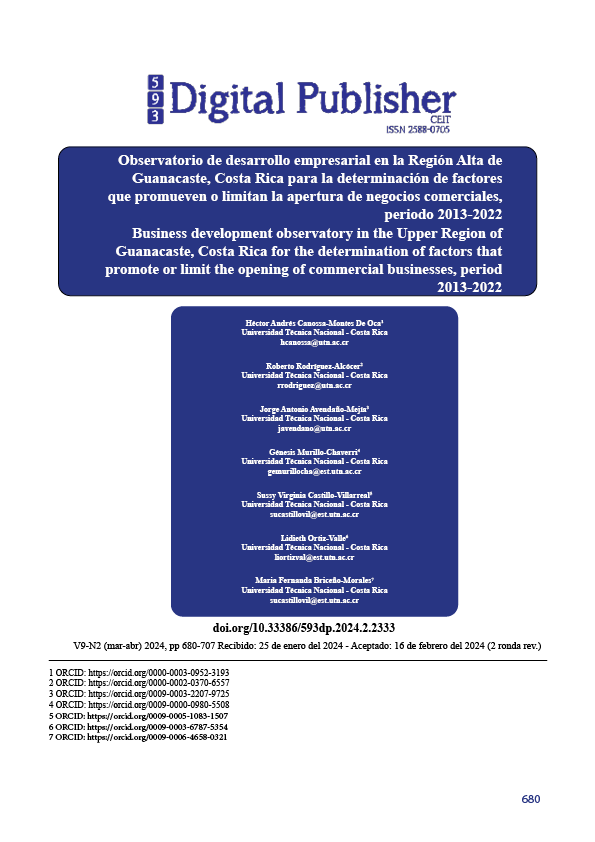Business development observatory in the Upper Region of Guanacaste, Costa Rica for the determination of factors that promote or limit the opening of commercial businesses, period 2013-2022
Main Article Content
Abstract
This article aims to design a business development observatory in the Upper Guanacaste Region for the determination of factors influencing the opening of business. Methodologically it is a research of mixed approach, non-experimental, of transversal temporality and based on the analysis of the variables business behavior, profile of companies, environmental factors, development of the region, and the role of the local government in the operation of the companies, were used as data collection techniques the documentary analysis with registered companies in the region patented, the semi-structured interview and the survey; participated in the study eight representatives of local governments and 106 companies distributed in the four cantons of the area (Cañas, Tilarán, Bagaces and Abangares). The main findings include the knowledge of the situation of business development in this region in the period 2013-2022 showing steady growth in the region, being the canton of Cañas that owns the most companies and collection by commercial licences, in addition the canton that has had the fastest growth is Tilarán. Environmental factors that promote business opening such as education, development programmes, attractions and support for entrepreneurship are identified; counterpart factors that can generate business closures include the size of the market, competition and ignorance to formalize the business. Finally, as a strategy for the implementation and continuity of the observatory, the elements of up-to-date and continuous information, the cooperation between local governments with the patent officers and the area related to local economic development are proposed to keep the information up to date, and to do field studies annually for the identification of influential factors in business development to promote concrete actions (implementation of strategies) towards and the region for the continuity and growth of and thus local development.
Downloads
Article Details

This work is licensed under a Creative Commons Attribution-NonCommercial-ShareAlike 4.0 International License.
1. Derechos de autor
Las obras que se publican en 593 Digital Publisher CEIT están sujetas a los siguientes términos:
1.1. 593 Digital Publisher CEIT, conserva los derechos patrimoniales (copyright) de las obras publicadas, favorece y permite la reutilización de las mismas bajo la licencia Licencia Creative Commons 4.0 de Reconocimiento-NoComercial-CompartirIgual 4.0, por lo cual se pueden copiar, usar, difundir, transmitir y exponer públicamente, siempre que:
1.1.a. Se cite la autoría y fuente original de su publicación (revista, editorial, URL).
1.1.b. No se usen para fines comerciales u onerosos.
1.1.c. Se mencione la existencia y especificaciones de esta licencia de uso.
References
ACAM (2023). ¿Qué es ACAM? https://www.acam.cr/front/pt1.php?ref=34#:~:text=Es%20la%20Asociaci%C3%B3n%20de%20Compositores,distribuir%20los%20derechos%20de%20autor .
Angulo, N. (2009). ¿Qué son los observatorios y cuáles son sus funciones? Innovación Educativa, 9(47), 5-17. https://www.redalyc.org/pdf/1794/179414895002.pdf
Arce, J & Villalobos, T. (26 de noviembre de 2021). Estado de Situación PYME en Costa Rica 2021. http://reventazon.meic.go.cr/informacion/estudios/2021/pyme/DIGEPYME-INF-038-2021.pdf
Arias, J. L. (2020). Técnicas e instrumentos de investigación científica (1ra ed.). Enfoques consulting.
Asamblea Legislativa de la República de Costa Rica. (2002). Ley de fortalecimiento de las pequeñas y medianas empresas y sus reformas. http://reventazon.meic.go.cr/informacion/legislacion/pyme/8262.pdf
Banca para el Desarrollo (2023) Servicios de Desarrollo Empresarial. https://www.sbdcr.com/emprendimiento/servicio-de-desarrollo-empresarial/
Banco Nacional. (2023). ¿Qué es el Sistema de banca para el desarrollo y cómo podría apoyar a tu pyme?. https://www.bncr.fi.cr/%C2%BFqu%C3%A9-es-el-sistema-de-banca-para-el-desarrollo-y-c%C3%B3mo-podr%C3%ADa-apoyar-a-tu-pyme-.html
Bejarano, H. D., González, L. A., & Matallana , A. F. (2018). Propuesta para el diseño de un observatorio de tendencias en investigación contable a nivel superior en Colombia. Aglala, 9(1), 340–372. https://doi.org/10.22519/22157360.1208
Bermúdez Carrillo, L. A. (2014). Características de las pymes de Guanacaste Features of the PYMES in Guanacaste. InterSedes, 15(30). https://doi.org/10.15517/isucr.v15i30.14867
Bertoletti, A., Berbegal-Mirabent, J. y Agasisti, T. (2022). Higher education systems and regional economic development in Europe: A combined approach using econometric and machine learning methods. Socio-Economic Planning Sciences, 82(A). https://doi.org/10.1016/j.seps.2022.101231
Brenes, L. (2013). Los observatorios y las redes como estrategias innovadoras de vinculación: Tendiendo puentes de equidad y desarrollo. https://www.uned.ac.cr/ocex/index.php/ocexinf/156-los-observatorios-como-estrategias-de-vinculacion
Cámara de Comercio de España. (2022) Observatorio de Competitividad Empresarial Cooperación Empresarial. https://www.camara.es/sites/default/files/publicaciones/observatorio_competitividad_cooperacion_empresarial_-_n7-2022.pdf
Campos, Y. (2022). Técnicas de investigación. Revista Académica Institucional, 3(1), 1–8. https://rai.usam.ac.cr/index.php/raiusam/article/view/40
Canossa, H., & Rodríguez, R. (2019). Estrategias de financiamiento, un reto para las pymes comerciales de Guanacaste. InterSedes, 20(42), 105–117. https://doi.org/10.15517/isucr.v20i42.41845
CEPAL (2023). Plan Regulador de Costa Rica. https://observatorioplanificacion.cepal.org/es/planes/plan-regulador-de-costa-rica#
Cisneros, A. J., Guevara, A. F., Urdánigo, J. J., Garcés, J. E. (2022). Técnicas e instrumentos para la recolección de datos que apoyan a la investigación científica en tiempo de pandemia. Dominio De Las Ciencias, 8(1), 1165–1185. https://doi.org/10.23857/dc.v8i1.2546
Colmenares, W. E. (2021). Aproximación al concepto de observatorio editorial: recomendaciones para su creación. Revista General de Información y Documentación, 31(1), 119-147. https://doi.org/10.5209/rgid.73471
De la O, D. & Monge, R. (2019). Factores que influyen en el desempeño de las PYMES: una perspectiva cualitativa de los empresarios costarricenses. Revista Academia & Negocios, 4(2), 95-106. https://revistas.udec.cl/index.php/ran/article/view/2554
Delgado, H.; Herrera Camargo, L; y Castro, J. (2022). Observatorio Social de Desarrollo Regional Local y de Derechos Humanos, propuesta para la ESAP. Administración & Desarrollo, 52(2), 5-25. https://doi.org/10.22431/25005227.vol52n2.1
Finol, M. & Vera, J. L. (2020). Paradigmas, enfoques y métodos de investigación: análisis teórico. Mundo Recursivo, 3(1), 1-24. https://www.atlantic.edu.ec/ojs/index.php/mundor/article/view/38
Hernández Sampieri, R., Mendoza Torres, C. P. (2018). Metodología de la investigación: las rutas cuantitativa, cualitativa y mixta. McGraw-Hill.
Hernández, C & Carpio N. (2019). Introducción a los tipos de muestreo. Revista Científica del Instituto Nacional de la Salud Alerta. 2(1):75-79. http://portal.amelica.org/ameli/journal/419/4191907012/html/
Instituto Nacional de Estadísticas y Censos [INEC]. (2023). Estadísticas Vitales. Cuadros, gráficos y figuras de: población, nacimientos, defunciones, matrimonios. Datos definitivos 2022. https://inec.cr/estadisticas-fuentes/estadisticas-demograficas?topics=91%252C799
Martins, J.M., Shahzad, M.F. y Xu, S. (2023). Factors influencing entrepreneurial intention to initiate new ventures: evidence from university students. Journal of Innovation and Entrepreneurship, 12(63). https://doi.org/10.1186/s13731-023-00333-9
Mendoza, J. J., Macías, G. M., & Parrales, M. L. (2021). Desarrollo empresarial de las mipymes ecuatorianas: su evolución 2015-2020. Revista Publicando, 8(31), 320-337. https://doi.org/10.51528/rp.vol8.id2253
Martínez, ,C. E., Bolívar, W. E. y Gutiérrez, N. M. (2021). Information source observatories: Concepts and theoretical review. Journal of Business and entrepreneurial, 5(3), 15-26. https: //doi. org/10. 37956/jbes. v5i3. 178
Municipalidad de Abangares. (s.f). Historia del cantón de Abangares. https://www.abangares.go.cr/index.php/mn-conozcanos/mn-micanton/mn-historiacanton
Municipalidad de Bagaces. (2019). Entorno y Demografía del Cantón de Bagaces. https://www.bagaces.go.cr/institucional/el-canton/entorno-demografia
Municipalidad de Cañas. (s.f). Misión del Área de Desarrollo Económico Local. https://www.municanas.go.cr/index.php/114-adel?start=12
Municipalidad de Tilarán. (2023). Cantón de Tilarán. https://www.tilaran.go.cr/tilaran/canton-de-tilaran.php
Municipalidad de Tilarán. (s.f). Oficina Desarrollo y Control local. https://www.tilaran.go.cr/institucional/topografia.php
Naciones Unidas. (1986). Declaración sobre el derecho al desarrollo. https://www.ohchr.org/es/instruments-mechanisms/instruments/declaration-right-development
Otzen, T & Manterola, C. (2017). Técnicas de Muestreo sobre una Población a Estudio. International Journal of Morphology, 35(1), 227-232. https://pesquisa.bvsalud.org/portal/resource/pt/biblio-840959
Periódico Mensaje (2022). Guanacaste posee el 38% de las empresas que están fuera de la Gran Área Metropolitana. https://www.periodicomensaje.com/turismo-negocios/9342-guanacaste-posee-el-38-de-las-empresas-que-estan-fuera-de-la-gran-area-metropolitana
Pimienta J. H., Estrada, R. M., de la Orden Hoz, A.(2018). Metodología de la investigación: competencias + aprendizaje + vida. Pearson Educación.
Quesada, O., Campos, E. & Quesada, G. (2013). Modelo de Competitividad Región Alta de Guanacaste. http://reventazon.meic.go.cr/informacion/competitividad/regionaltaguanacaste.pdf
Quituizaca, L., Vásquez, C. & Uriguen, P., (2022). Influencia del entorno externo e interno en la toma de decisiones gerenciales. 593 Digital Publisher CEIT, 7(2), 339-354 https://doi.org/10.33386/593dp.2022.2.1046
Ramírez, Y. & Salas, L. (2018). Propuesta para la creación de un observatorio de emprendimiento, del programa de administración de empresas, seccional Girardot. https://repositorio.ucundinamarca.edu.co/handle/20.500.12558/2005
Sánchez (2023). Visite Abangares: El cantón que brilla por su naturaleza y actividad minera. https://www.nacion.com/tiempo-libre/turismo/abangares-el-canton-sin-parque-central-que-brilla/2A3WVLQKBRC2FJTZV6LNTWEUGE/story/
Sánchez, F. A. (2019). Fundamentos epistémicos de la investigación cualitativa y cuantitativa: Consensos y disensos. Revista digital de investigación en docencia universitaria, 13(1), 102-122. http://www.scielo.org.pe/scielo.php?script=sci_arttext&pid=S2223-25162019000100008
Sarmiento, Y. R., Delgado, M., & Infante, B. (2019). Observatorios: clasificación y concepción en el contexto iberoamericano. Rev. Cub. Inf. Cienc. Salud, 30(2). https://pesquisa.bvsalud.org/portal/resource/pt/biblio-1093068?src=similardocs
Universidad de Costa Rica. (2023). Observatorios. https://www.fcs.ucr.ac.cr/index.php/investigacion/observatorios
Useche, M. C., Artigas, W., Queipo, B., & Perozo, E. (2019). Técnicas e instrumentos de recolección de datos cuali-cuantitativos. Universidad de la Guajira https://repositoryinst.uniguajira.edu.co/handle/uniguajira/467








